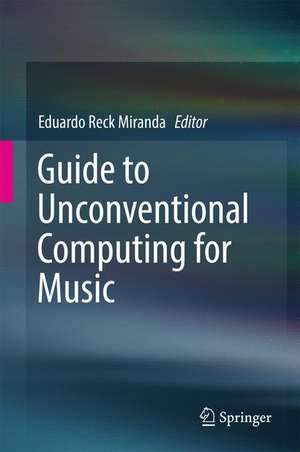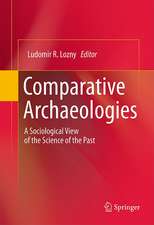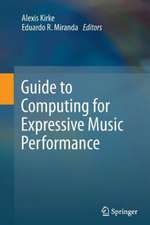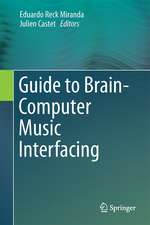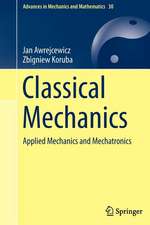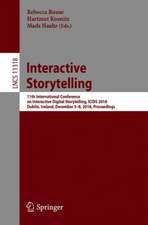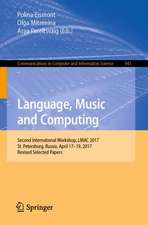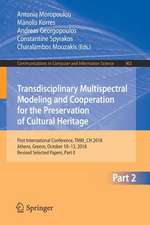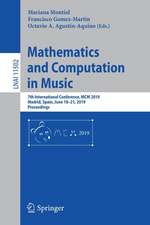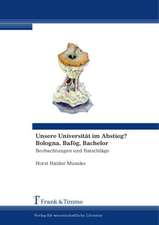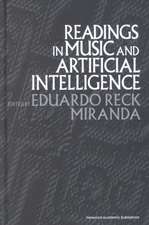Guide to Unconventional Computing for Music
Editat de Eduardo Reck Mirandaen Limba Engleză Hardback – mar 2017
| Toate formatele și edițiile | Preț | Express |
|---|---|---|
| Paperback (1) | 415.24 lei 38-44 zile | |
| Springer International Publishing – 13 iul 2018 | 415.24 lei 38-44 zile | |
| Hardback (1) | 438.38 lei 38-44 zile | |
| Springer International Publishing – mar 2017 | 438.38 lei 38-44 zile |
Preț: 438.38 lei
Preț vechi: 547.97 lei
-20% Nou
Puncte Express: 658
Preț estimativ în valută:
83.91€ • 91.18$ • 70.53£
83.91€ • 91.18$ • 70.53£
Carte tipărită la comandă
Livrare economică 18-24 aprilie
Preluare comenzi: 021 569.72.76
Specificații
ISBN-13: 9783319498805
ISBN-10: 3319498800
Pagini: 284
Ilustrații: XI, 284 p. 150 illus., 72 illus. in color.
Dimensiuni: 155 x 235 x 17 mm
Greutate: 0.76 kg
Ediția:1st ed. 2017
Editura: Springer International Publishing
Colecția Springer
Locul publicării:Cham, Switzerland
ISBN-10: 3319498800
Pagini: 284
Ilustrații: XI, 284 p. 150 illus., 72 illus. in color.
Dimensiuni: 155 x 235 x 17 mm
Greutate: 0.76 kg
Ediția:1st ed. 2017
Editura: Springer International Publishing
Colecția Springer
Locul publicării:Cham, Switzerland
Cuprins
Introduction to Unconventional Computing.- On Unconventional Computing for Sound and Music.- On Biophysical Music.- The Transgressive Practices of Silicon Luthiers.- Experiments in Sound and Music Quantum Computing.- Memristor in a Nutshell.- Physarum Inspired Audio: From Oscillatory Sonification to Memristor Music.- An Approach to Building Musical Bioprocessors with Physarum polycephalum Memristors.- Towards a Musical Programming Language.
Notă biografică
Prof. Eduardo Reck Miranda is a composer and Professor in Computer Music at Plymouth University, UK, where he is Director of the Interdisciplinary Centre for Computer Music Research (ICCMR). His previous publications include the Springer titles Guide to Brain-Computer Music Interfacing and Guide to Computing for Expressive Music Performance.
Textul de pe ultima copertă
This pioneering text/reference explores how innovative new modes of computation may provide exciting new directions for future developments in the music industry, guiding the reader through the latest research in this emerging, interdisciplinary field. This work includes coverage of electronic music compositions and performances that incorporate unconventional interfacing, hacking and circuit bending.
Topics and features:
Prof. Eduardo Reck Miranda is a composer and Professor in Computer Music at Plymouth University, UK, where he is Director of the Interdisciplinary Centre for Computer Music Research (ICCMR). His previous publications include the Springer titles Guide to Brain-Computer Music Interfacing and Guide to Computing for Expressive Music Performance.
Topics and features:
- Presents an introduction to the broader field of unconventional computing, and to the application of unconventional computing in music composition and performance
- Discusses initiatives involving biophysical electronic music, the work of self-styled silicon luthiers, and the intersection of music and quantum computing
- Introduces the memristor, a new electronic component with the potential to revolutionize how computers are built in the future
- Reviews experiments and practical applications of biological memristors inmusic
- Describes IMUSIC, an unconventional tone-based programming language, which enables the programming of computers using musical phrases
- Includes review questions at the end of each chapter
Prof. Eduardo Reck Miranda is a composer and Professor in Computer Music at Plymouth University, UK, where he is Director of the Interdisciplinary Centre for Computer Music Research (ICCMR). His previous publications include the Springer titles Guide to Brain-Computer Music Interfacing and Guide to Computing for Expressive Music Performance.
Caracteristici
The first book on musical applications of unconventional computing and, as such, an important reference in the field Presents a focus on an emerging and promising application of computer science Includes revision questions at the end of each chapter highlighting important points to be learned, and introductory tutorials for novices, as well as more advanced research-informed descriptions Includes supplementary material: sn.pub/extras
